“Among other things, you’ll find that you’re not the first person who was ever confused and frightened and even sickened by human behaviour. You’re by no means alone on that score; you’ll be excited and stimulated to know. Many, many men have been just as troubled morally and spiritually as you are right now. Happily, some of them kept records of their troubles. You’ll learn from them—if you want to. Just as someday, if you have something to offer, someone will learn something from you. It’s a beautiful reciprocal arrangement. And it isn’t education. It’s history. It’s poetry.” by J.D. Salinger, The Catcher in the Rye
Try Audible and Get Two Free Audiobooks
Lines above are from the novel, “The Catcher in the Rye” by J.D. Salinger published in 1951. Often cited as one of the most forthcoming books regarding depicting the inner turmoil and mindset of a young adult during the teenage ‘rebellion years’- as they call it- it has been included on Time Magazine’s 2005 list of the 100 best English-language novels written since 1923, and Modern Library and its readers have named it as one of the best books of the century.
In 2003, it was listed at number 15 on the BBC’s survey The Big Read. The protagonist of the ‘The Catcher in the Rye’ was the protagonist of a short story Salinger had written before. Salinger drew his own emotions while explaining the emotional turmoil and identity crisis of the protagonist goes through. The book was a significant success and has dedicated cult following to this day.
This novel has always been the topic of debate among the parents and authorities as to whether the teenagers in high school should be allowed access to this novel as it contains undermining authority and values, rebellion, drinking, lying, abuse, promiscuity on protagonist’s part. But this has only contributed to the popularity of the book. However, some shootings have been associated with this novel as a tribute.
I have, after reading this novel, felt that the more we will shy away from discussing this feeling of anger which teenagers face, the more they will fail to understand what the author wanted to convey. Rather than promoting these things, he had tried to raise awareness around the feeling of depression and disconnect from the world at this age. He had attempted to normalize the sudden curiosity we face regarding various things which are not considered appropriate and to feel that the society has did you wrong.
However, these feelings should be accepted, and one should take time to understand that everything is not as black and white as we want. No matter how frustrating and dark it gets, no matter how much we lose hope in the future, we should try to self-analyze and come to terms with our circumstances.
The Plot of the Story
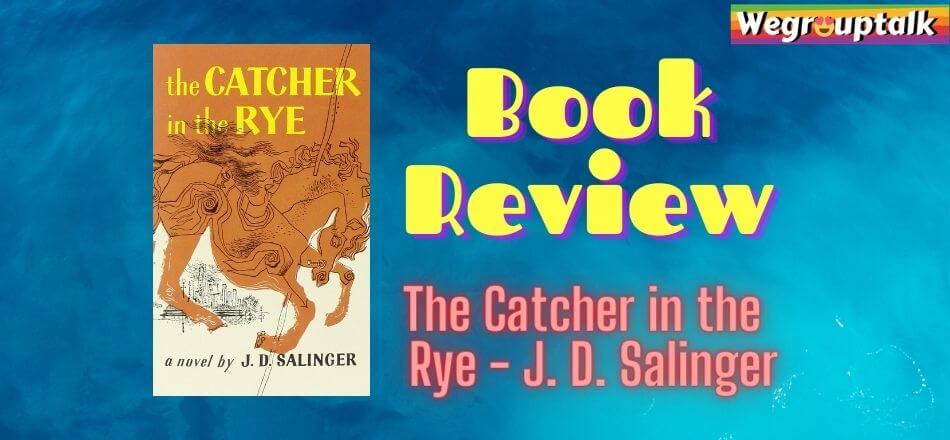
The story of the novel is told by the protagonist himself in the first person, Holden Caulfield, while he is admitted to a mental hospital. He starts recalling his past as to what drove him to this condition. Recalling the events leading up to the previous Christmas, the story begins at Pencey Preparatory Academy, a boarding school in Pennsylvania, where Holden won’t be allowed back after the break due to flunking all classes except English.
He forfeits a fencing match in New York and returns to school early. He decides to visit Mr Spencer, his old history professor. Mr Spencer holds affection for him and offers him advice that ‘Life is a game, boy. Life is a game that one plays according to the rules.’ and critics Holden for his garbage history exam and worries about his bleak future. Holden escapes from his teacher’s home, not wanting to be lectured.
He returns to his dorm, where Robert Ackley, Holden’s neighbour, disturbs him. Ackley is a pimply, awkward boy with terrible dental and personal hygiene which is unpopular among his peers. Later, Holden agrees to write an English composition for Ward Stradlater, his handsome and popular roommate. He learns that he is going on a date with Jane Gallagher, for whom Holden has feelings and admires.
Holden has an altercation with his roommate on his return when he nonchalantly refuses to tell Holden any of the details about his date, jokes about Jane (Holden feels protective about the virtue of Jane) and fails to admire the profoundly personal composition Holden has written for him about the baseball glove of Holden’s late brother Allie. The latter died of leukaemia three years earlier.
After this fight and fed up with the “phonies” at Pencey Prep, Holden decides to leave early and catches a train to New York. He intends to stay away from his home until Wednesday when his parents would have received notification of his expulsion.
Roaming in the city alone; thus, Holden tries to find a connection with the people and to feel something. He propositions nearly every woman he encounters, invites his classmate’s mother to get a drink, dances with older female tourists staying at his hotel, arranges to have a prostitute sent to his room and tries to convince an old date, Sally to run away with him. Holden’s quest for sexual knowledge leads to having a drink with Carl Luce, his old gay classmate, who he feels is very experienced. However, Carl is possibly confused about his sexuality and advises Holden to visit a psychoanalyst.
Finally, Holden sneaks into his parent’s apartment to meet his ten-year-old sister-Phoebe. Phoebe confronts him about his aimlessness and disinterest in everything. Holden although shares about his fantasy of being a saviour of children by saving them from falling off a cliff (misinterpreting “catcher in the rye” poem of Robert Burns).
After Holden slips out as his parents arrive and visit his former and much-admired English teacher, Mr Antolini, who expresses his concern that Holden is headed for “a terrible fall”. But he slips out in the middle of the night when he wakes up to find Mr Antolini patting his head, which he interprets as a sexual advance and spends the rest of the night in a waiting room at Grand Central Station.
Losing hope of finding belonging and sinking further into despair, Holden decides to head out west and live a reclusive lifestyle in a log cabin. He decides to see Phoebe one last time at lunchtime to explain his plans and give farewell. However, asks to go with him which Holden refuses upsetting Phoebe. They eventually reach the zoo’s carousel, where they make up after he buys her a ticket. Holden is finally filled with happiness and joy at the sight of Phoebe riding the carousel.
Holden eventually agrees to contact his parents that night and “getting sick” and that he will be attending another school in September. Holden says that he doesn’t want to tell anything more because talking about his past has made him miss his former classmates.
ANALYSIS
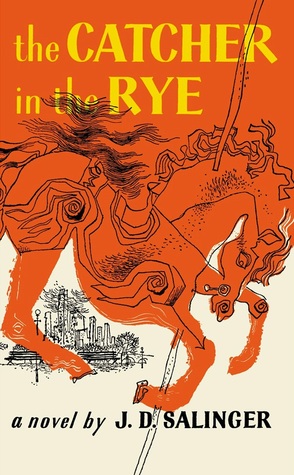
This novel tells the coming of the age story of our protagonist Holden and depicts the inner emotional turmoil that a young adult goes through. Holden might come off as another stupid–rich kid initially, but he is an avid reader and highly observant teenager. The painful age of growing up, coupled with the inability to connect and be understood by the world while struggling with your identity crisis leads to what adults like to term rebellion. This is, however, the individual’s confusion and sudden changes in both his emotions and body, which leads to this behaviour.
Suddenly, a child is forced to navigate the vast and varied scape of this world, while deciphering one’s definition and understanding of religion, Body image, sexuality, society and appearances-this is undoubtedly very hard and confusing. This leads to feelings of loneliness, discontent and disconnect from the environment and people.
Holden comes across as an unreliable narrator because of his frequent lying and misinterpretation about his circumstances while having constant critique and mistrust on those around him. He refuses to acknowledge his real thoughts and feelings about people, situations and himself thus being highly hypocritical and judgmental. One can easily guess, very early in the novel, that he is lonely and going through a trauma which runs more profound than the surface of his distaste for the “phonies”, “commercialization” and “sexuality”.
Death of his brother Allie and suicide of his former classmate Elkton Hill while wearing his turtleneck are some traumas which Holden still had not overcome and confronted. He had refused to come to grips with his adolescence and idealizes childhood which is clear from his fantasy of becoming a saviour of children’s innocence( from a wrong interpretation of the poem), Jane’s virtue and his praise for his intelligent sister ( for whom he becomes worried on seeing a ‘fuck’ graffiti) and a brother who died young.
Holden is constantly looking for connection and confused about his morality around casual affairs which is clear from his disdain about people when he says they never notice anything, his activities to explore his sexuality in New York, reminiscing about happier times with Jane and ultimately sneaking back to meet his sister on losing all hope.
As the novel progresses, Holden losses his grip over the reality and is headed for a “terrible fall”, as marked by his teacher, when he propositions Sally to run away with him, a girl he can barely stand, fantasizes about his death and admits that he can’t control his emotions.
While reading the novel, I felt that the protagonist had alienated himself from the world to save him from feeling hurt and despair. He always judged people to keep himself from acknowledging his shortcomings.
However one should also realize the apathy of the elders towards the people of this age whom they expect to have it all figured out and be obedient even though this is the period when one can be the most confused that he/she can be. Holden was resisting change, apparent by his love for museum artefacts, and did not want to be judged. He is curious yet does not want to probe further for fear of getting let down and thus concludes that the world is shallow, superficial, and nobody can understand him.
Struggling with his identity and his place in the world, he decides that New York is a shitty place and his script-writer brother his prostituting himself, yet wants to roam and gets enchanted by the city (particularly the museum and central park) and goes to movies and theatres. He decides that casual affairs are not moral yet indulges in such behaviour and is curious about it.
He craves deeper connection as apparent with his memories with Jane(only one to whom he had shown the glove) and his sister yet gets involved with prostitutes. The mention of the red cap shows he tries to hide himself and his repeated query regarding ducks shows his longing for the simpler times. He judges his roommate Will, calling him a slob, for his promiscuous behaviour but is in awe of him.
Holden is very lonely, which becomes the central recurring theme in the novel as he keeps talking to himself, Allie and calling out the reader with the references ‘you’. Also, he keeps regretting the fact that the reader can’t be present with him at certain key moments, know some important people of his Life and experience certain emotions which made me realize that above anything else, Holden craves company and attention.
His satire that people don’t notice when he lies acts older or do something irrational is more of a call of help than being calm and wise. Holden struggles with religion. As much he craves spiritual connect he hates the foundations the mass practices bring. He hates the sense of entitlement power and popularity gets. He hates how people show off. He had idealized childhood as a phase where one is innocent and happy, failing to realize that seldom the world is as simple as he would like.
Holden can be a highly self-critical person and calls everyone “phoney”. But to realize the shallowness and superficiality of Holden himself, one needs to read his conversations with his teacher Mr Antolini and his sister.
REVIEW
The novel does its work, using the weapons of realism, satire and hyperbole, the author has accurately conveyed the world through the eyes of a troublesome teenage boy who is unsure of himself yet somehow thinks he is better than everybody else- did or did not we all thought the same of ourselves at that stage?. Holden is insecure about his looks; he terms himself as too frail and tries to hide among the crowds.
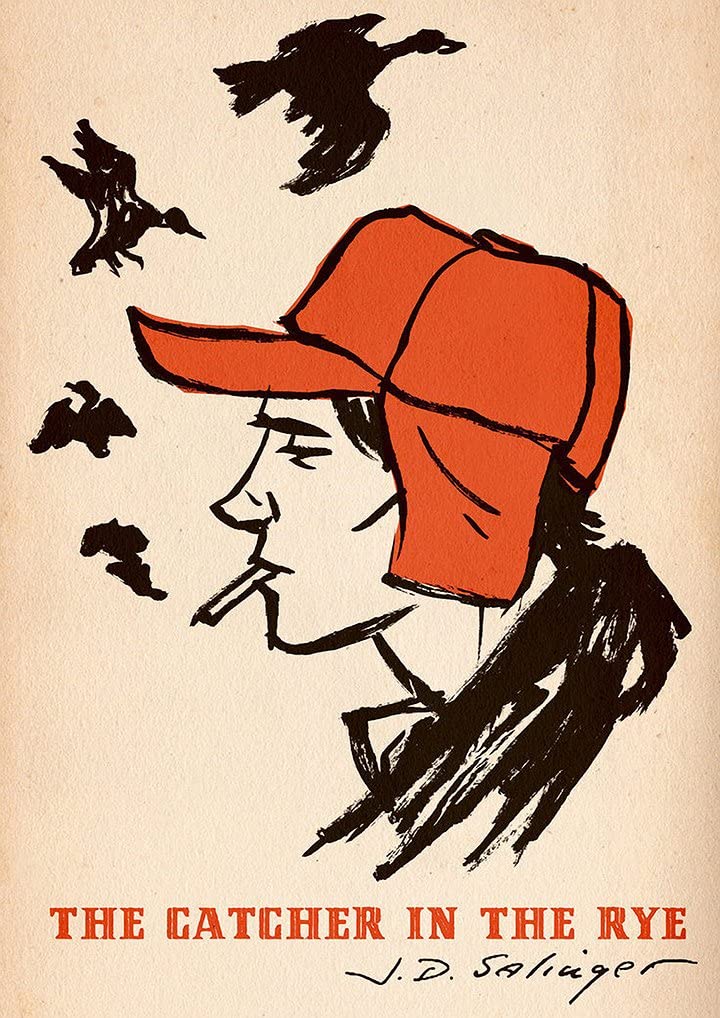
This novel was initially marketed for adults maybe because Salinger wanted adults to see how utterly confusing and terrifying it is to be a teenager. However, over time, due to its reliability, it became popular among teenagers. This is the novel which changes its dynamics of liking according to your age. As a teenager, you might love it, but if you pick it up after a few years, you will hate the protagonist and his decisions while calling him a coward and misanthrope.
You might say that this rich kid is stupid and egoistic, has the best things and opportunities of the world yet going around wasting everything while making up stories to gain sympathy. Ultimately, the novel would still force you to think, question and reevaluate yourself. It will encourage you to be understanding and reach out to these teenagers.
Nevertheless, it resonated with me, maybe because I struggle with the same things that Holden worked. Acceptance is a hard pill to swallow. You can’t just wake up one day and be okay with it. It’s a long and challenging process where you can’t expect people to walk with you or enable you. But then most of life is. Hate and judgment are easy; it comes naturally. But to channel that energy towards something productive is very hard.
Evading responsibilities and circumstances are easy, but to stand up, stay and work for change is very hard. It is easy to hate the system, but to change it; it takes tons of personality, ideals and courage. To stop caring what others think of us and follow our passions ruthlessly is extremely hard, yet, the only solution to our insecurities.
The novel raises awareness about the mental health of a young adult and persuades people to think deeper and normalizes to take time for them – because if one can’t be right in the mind, how far will he go without falling? The villain of the story is Holden himself as he had held everyone at an arm’s distance out of fear and inauthenticity.
If you have struggled with depression in your teenage years, you will realize that what Holden goes through is the beginning of a deep fall. However, his finally reaching out to his parents, and subsequent therapy is what saves him from the irreparable loss. One can’t say that what Holden concludes about the society is wrong- the phoney, superficial, rude, cruel-the world is challenging and will continue to be. However, we all have our place and people who care for us.
Maybe one day, I hope Holden would have understood that you can’t expect everyone to be kind, real and fair. You can’t expect the time to stop and absolute innocence to persist forever. Maybe one day, he would have learned how to drive on the road of Life without getting totalled by phoniness and pessimism.
Maybe one day, he will learn how to express himself without the fear of being judged. Maybe one day, he will learn to put out his ideas without the fear of being mocked. Maybe one day, he will accept his body and appearance learning that genuinely, everyone is unique. Till then, I hope, I too reach and get the same conclusions what I want Holden to get.
BEST QUOTES from the Book “The Catcher in the Rye”
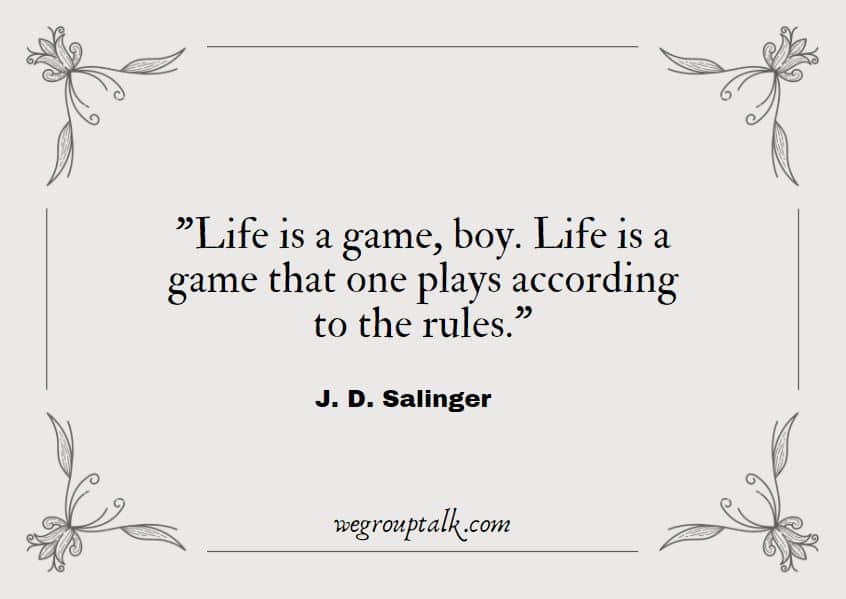
“What knocks me out is a book that, when you’re all done reading it, you wish the author that wrote it was a terrific friend of yours, and you could call him up on the phone whenever you felt like it. That doesn’t happen much, though.”
“I am always saying “Glad to’ve met you” to somebody I’m not at all glad I met. If you want to stay alive, you have to say that stuff, though.”
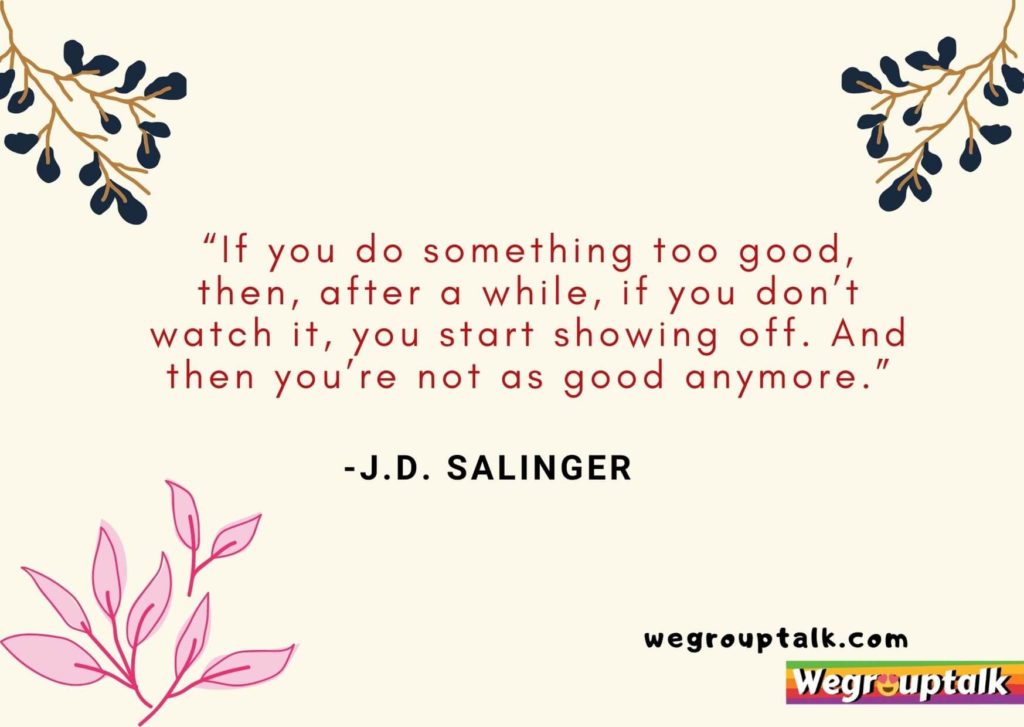
“Certain things, they should stay the way they are. You ought to be able to stick them in one of those big glass cases and leave them alone.”
“I was trying to feel some goodbye. I mean I’ve left schools and places I didn’t even know I was leaving them. I’m not too fond of that. I don’t care if it’s a sad goodbye or a bad goodbye, but when I leave a place, I like to know I’m leaving it. If you don’t, you feel even worse.”

ABOUT THE AUTHOR

J.D. Salinger was born on January 1, 1919, in Manhattan, New York to Jewish-American family. He was a mediocre student although plenty interested in literature. In 1938, he attended Ursinus College in Pennsylvania but dropped out. In 1939, he joined Columbia University where he took the writing class of Whit Burnett. During World War, he was assigned to counterintelligence unit where he interrogated prisoners.
However, his experiences in war had a deeply personal impact on him, and he suffered PTSD. Salinger became an avid follower of Buddhism and used to give a reading on its text. Salinger experimented with his beliefs and principals so much that it leads to the breakdown of his marriage with Claire Douglas. After this divorce, Salinger’s life was marred by a series of failed relationships and legal battles regarding the illegal usage of his work. He died on January 21, 2010, of natural causes at 91 years of age.
Salinger is known for his young readers and young characters. His work has been brutally honest, harsh and realistic regarding the life and minds of his teenage characters. His experiments with writing about the cruelness and sinister nature of the society while depicting the simple and innocent nature of childhood have earned him a revolutionary place in the world of literature.
At last, I would like to say, to stay alive you do different things, make compromises. However, take some time to know yourself. This good read was a stable 4 star read for me out of five. And I would recommend you to read it, ponder over it rationally and accept that healing always comes from a place of acceptance.
Also Read THE BOOK REVIEW OF THE ALCHEMIST


